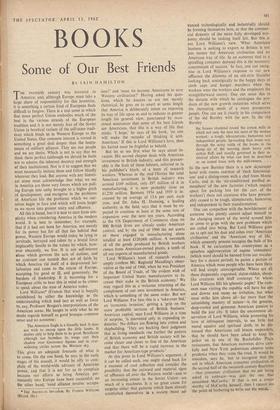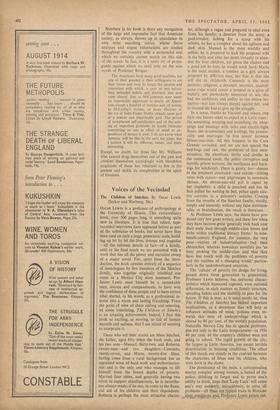BOOKS
Some of Our Best Friends
BY 1A1N HAMILTON THE twentieth century was invented in America; and, although Europe must take a large share of responsibility for ihis invention, it is something a certain kind of European finds difficult to forgive. There is a real sense in which that more perfect Union embodies much of the best in the various strands of the European tradition and it is not merely fear of the Soviet Union (a heretical variant of the self-same tradi- tion) which binds us in Western Europe to the United States. Our common interest is rooted in something a great deal deeper than the instru- ments of military alliance. They are our people and we are theirs. Which is not to say that we think them perfect (although we should be fools not to admire the inherent decency and strength of their institutions). Nor is it to suggest that we must necessarily imitate them and follow blindly wherever they lead. But anyone with any histori- cal sense must acknowledge that what we see in America are those very forces which are pull- ing Europe into unity brought to a higher pitch of development; and recognise in the problems of American life the problems which we our- selves begin. to face and which will loom larger as we move into greater unity and affluence.
All this 'is banal, but it is best to start from sim- plicity when considering America in the modern world. It is best to remember, for example, that if it had not been for America, not merely for its power but for all that lies behind that power, Western Europe would today be lying in servitude, betrayed and taken by a brutal force implacably hostile to the values by which, how- ever obscurely, we live. It is not self-interest alone which governs the acts of nations, and no cynicism can tarnish that act of faith by Which America rid itself of a deep-rooted iso- lationism and came to the rescue of Europe, accepting for good or ill, and generously, the burdens of leadership. It is becoming for a European critic to bear this in mind as he conies to speak about the state of America today.
Lord Williams* (Francis that was) is happily uninhibited by either the knowledge or the understanding which lend tact as well as force to, say, Professor Brogan's interpretations of the American scene. He barges in with' what he no doubt regards himself as good brusque common sense and no nonsense: The American Eagle is a friendly bird. It does not wish to swoop upon the little lambs. It desires only to help them to be good. Beneficent although not harmless its wings cast their shadow over Grosvenor Square and in ever- widening circles across the Western sky.
This gives an adequate foretaste of what is to come. On the one hand, he says in the early stages of his assault, it would be silly to com- plain of the world-wide advance of American power, and that it is not for us to complain because our efforts to bring America per- manently into Europe have been successful; on the other hand, 'need alliance involve occupa-
• THE AMFRICAN iNVAMON. By Francis Williams. (Blond, 18s.)
tion?' and 'must we become Americans to save Western civilisation?' Having asked his ques- tions, which he assures us are not merely rhetorical, he goes on to assert at some length that America is deliberately intent on imposing its way of life upon us and to indicate at greater length his general view, punctuated by occa- sional assurances that some of his best friends are Americans, that this is a way of life that stinks. 'I hope,' he says of his book, `no one will make the mistake of thinking it anti- American.' If this is Lord Williams's love, then his hatred must be frightful to behold.
But let us see first what he says about in- vasion. His second chapter deals with American investment in British industry, and this presum- ably is the fruit of those labours, referred to in his publisher's blurb, of a team of research workers. Whereas in the mid-Thirties the total American investment in British industry was around £169 million, only £97 million of it in manufacturing, it is now probably close on £1,250 million. Between 1954 and 1959 it in- creased by an average of 13.6 per cent. each year, and Dr. John H. Dunning, a leading authority in the field, says that it must be ex- pected to continue at least at the same rate of expansion over the next ten years. According to the US Department of Commerce close on 800 British firms are already under American control, and by the end of 1960 the net assets of those engaged in manufacturing alone totalled at least £120,000 million. A twentieth of all the goods produced by British workers comes from American-owned plants, a tenth of all our exports of manufactured goods.
Lord Williams's team of research workers amply confirm Mr. Reginald Maudling's obser- vation at the end of 1960, when he was President of the •Board of Trade, of 'the evident wish of important United States manufacturers to in- crease their stake in the British economy.' We may regard this as a welcome returning of the compliment of our own investment in America, which is something of the same order. But not Lord Williams. For him this is a 'take-over bid,' an 'economic invasion,' getting a, 'grip on the more profitable sections of British, business.' American capital, says Lord Williams in a tone of surprise, is interested only in expanding in- dustries.' No dollars are flowing into cotton and shipbuilding. 'They are backing their judgment that as living standards rise further the pattern of .British economy and British society will be- come closer and closer to that of the American and that there will be a rapid increase in the market for American-type products.'
At this point in Lord Williams's argument, if it can be called such, one might stand back for a moment of cool reflection and consider the possibility that the outward and material signs of affluence all over the Western world—and to an increasing extent in the Soviet Union—are much of a muchness. It is no great cause for surprise either that patterns which have already established themselves in a society more ad-
vanced technologically and industrially should be forming themselves here, or that the commer- cial dynamic of the more fully developed eco- nomy should be making itself felt. But this ,is not Lord Williams's view. 'What American business is seeking to export to Britain is not just money but American civilisation and an American way of life. In an economy tied to a spiralling consumer demand this is the necessary concomitant of success.' In fact, one can recog- nise in Lord Williams's response to our new affluence the dilemma of an old-style Socialist looking back nostalgically to the happy days of cloth caps and hunger marchers when the workers were the workers and the employers the straightforward enemy. One can sense this in the distaste with which he catalogues the pro- ducts of the new growth industries which serve the increasing needs of a more Prosperous people. One can see it clearly in his comparison of the old Burnley with the new. In the old Burnley
the houses clustered round the cotton mills in which not only the men but most of the women worked : a tough, idiosyncratic, humorous and independent people, lip-reading their ironic way through the noisy rattle of the looms in the damp air of the weaving sheds heavy +..% ith cotton fluff, and usually governed in their in- dustrial affairs by what can best be described as an armed truce with the mill-owners. . . .
In the new Burnley there is a new skyscraper hotel with rooms redolent of 'sleek functional- ism' and a dining-room with a chef from Monte Carlo, and in the 'air-conditioned purified at- mosphere' of the new factories ('which require space for parking lots for the cars of the workers') there toil creatures who have presum- ably ceased to be tough, idiosyncratic, humorous and independent in their transformation.
One can sympathise with the bewilderment of someone who plainly cannot adjust himself to the changing nature of the world around him or come to grips with the new problems which are called into being. But Lord Williams goes on to spit out his dust and ashes over 'American civilisation' and the 'American way of life,' which unseemly process occupies the bulk of his book. If he caricatures his countrymen as a spineless agglomeration of supine 'consumers' (which word should be banned from our vocabu- lary for a decent period), he paints a picture of America which most people who have been there will find simply unrecognisable. Where are all those desperately organised, status-ridden, sheep- like creatures with bluff contempt for whom Lord Williams fills his splenetic pages/ The com- mon man visiting the republic will have his ups and downs and many an irritation, but what must strike him above all—far more than the astonishing mastery of nature—is the genuine, deep-rooted and generous American passion to build the just city. It takes the uncommon ob- servation of Lord Williams, while protesting his love at infrequent intervals, to see little but moral squalor and spiritual sloth, to be dis- tressed that Americans call braces suspenders, that he should have been asked to keep his jacket on in one of the Rockefeller Plaza restaurants, that American motorists drive care- fully and New York pedestrians observe some prudence when they cross the road. It would be mistaken, says he, 'not to recognise that the soil in which American consumer civilisation of the second half of the twentieth century flourishes —that consumer civilisation that we are being asked to embrace—was also the one that nourished McCarthy.' If that is not a smear worthy of McCarthy himself, then I cannot see the point of bothering to write out the words.
Nowhere in his book is there any recognition of the large and impressive fact that American society, as always, throws up in abundance its own most searching critics, whose fierce analyses and urgent exhortations are studied throughout the country with a purposeful zeal which we certainly cannot match on this side of the ocean. In fact, it is a nasty bit of propa- ganda against which we need only set the wise words of Professor Brogan: The Americans have many good qualities, but one of their greatest is their willingness to cut their losses and even to forget the passion and conviction with which, a year or two before, they defended beliefs and doctrines that now seem absurd. Just as McCarthyism now seems an improbable nightmare to nearly all Ameri- cans except a handful of fanatics and, of course, to McCarthy's victims, so many illusions of the era of John Foster Dulles already seem part of a remote and improbable past. The period of complacent self-satisfaction and of the solv- ing of important problems by handy formulas committing no one to effort of mind or ex- penditure of money is over. I do not know what America will be like in the next ten years, but I believe it will be different, better, and more interesting.
Except, no doubt, for those like Mr. Williams who cannot drag themselves out of the past and comfort themselves accordingly with bloodshot suspicions of those less reluctant to live in the present and tackle its complexities in the spirit of freedom.



































 Previous page
Previous page